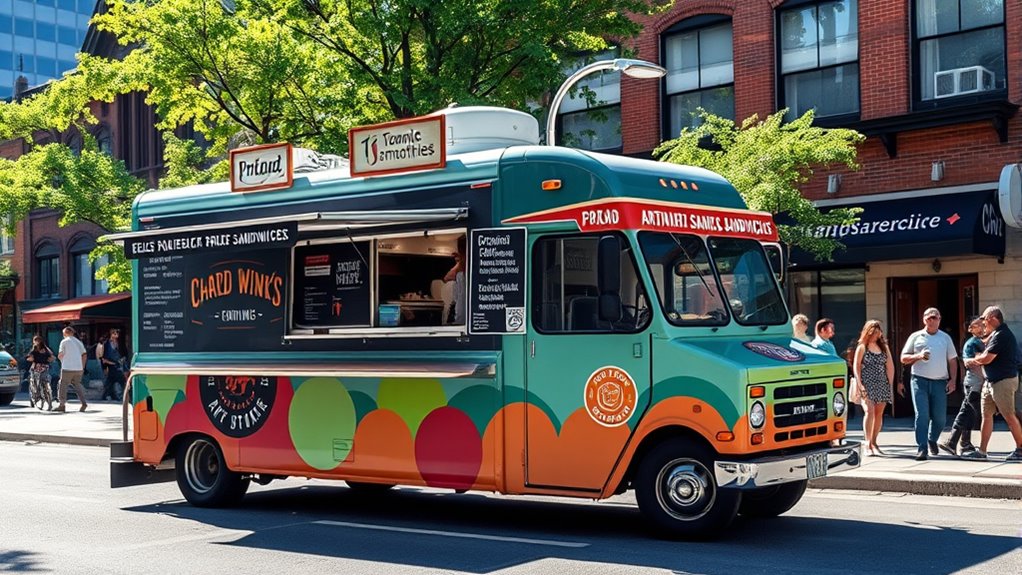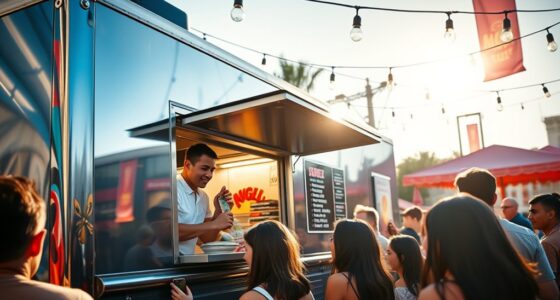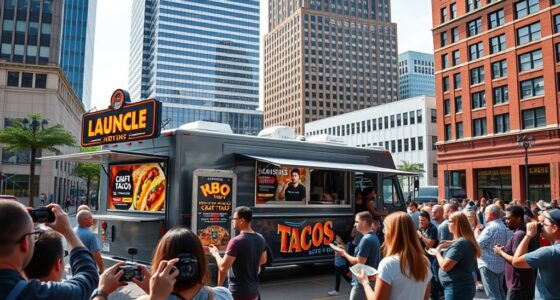To open a food truck in Portland, Oregon, you need to secure multiple permits and licenses, including a mobile food vendor permit from the Health Department, zoning approval, and possibly fire and transportation permits. Budget for truck purchase, equipment, insurance, and permits, with costs varying widely. Choose busy locations with proper zoning, develop a safe, compliant menu, and utilize marketing strategies like local events and social media. Keep up with regulations to stay compliant—if you’re curious about all the steps involved, there’s more to discover.
Key Takeaways
- Obtain necessary permits and licenses from Portland’s Environmental Health Department, including food truck, zoning, and fire permits.
- Budget for initial costs like truck purchase, equipment, permits, insurance, and ongoing expenses such as fuel and supplies.
- Select high-traffic locations compliant with Portland zoning laws, and engage with local community events to boost visibility.
- Develop a simple, compliant menu focusing on safe, easily prepared foods, and ensure food safety standards are met.
- Use social media, local events, and branding strategies to market your food truck and maintain detailed records for inspections and permits.
Navigating Permits and Licensing Requirements
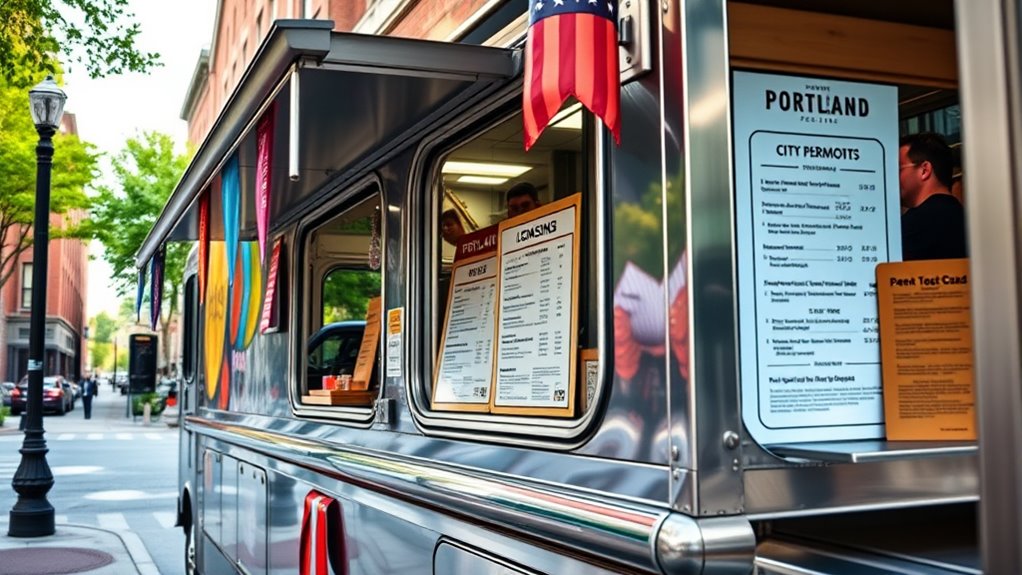
Planning permits and licensing requirements is a crucial step before launching your food truck in Portland. You must obtain a food truck license from the local Environmental Health Department after they review your plan. Your license depends on your truck’s classification, which is based on menu type and operations, affecting whether a commissary kitchen is necessary. You’ll also need to register your business with the Oregon Secretary of State or your city hall. A mobile food vendor permit from city or county health departments is typically required, costing between $100 and over $1,000 annually. Additionally, Portland-specific permits include zoning approval for private property sales, transportation department approval for public streets, and electrical and fire permits. Ensuring compliance with Oregon Administrative Rules guarantees your operations meet sanitation and safety standards. Understanding local regulations is essential to avoid fines and ensure smooth operation within the city limits. Familiarity with licensing processes can help streamline your setup and prevent delays.
Understanding Costs and Insurance Obligations
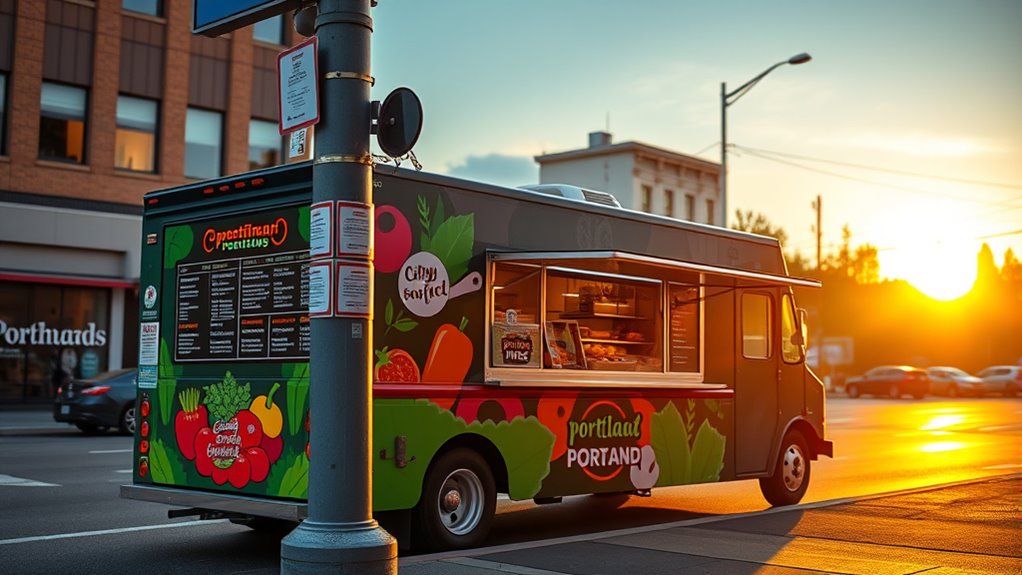
Understanding the costs and insurance obligations is essential when opening a food truck in Portland, as these factors substantially impact your budget and legal compliance. Your initial investment covers purchasing or leasing the truck, outfitting it to meet safety standards, and kitchen equipment. Operating costs include fuel, supplies, maintenance, commissary fees, and wages. Insurance premiums range from about $500 annually for basic coverage to several thousand for full protection. You’ll also need permits, licenses, and marketing expenses. Proper planning for insurance coverage can help protect your business from unforeseen liabilities.
Choosing Prime Vending Locations and Zoning Compliance
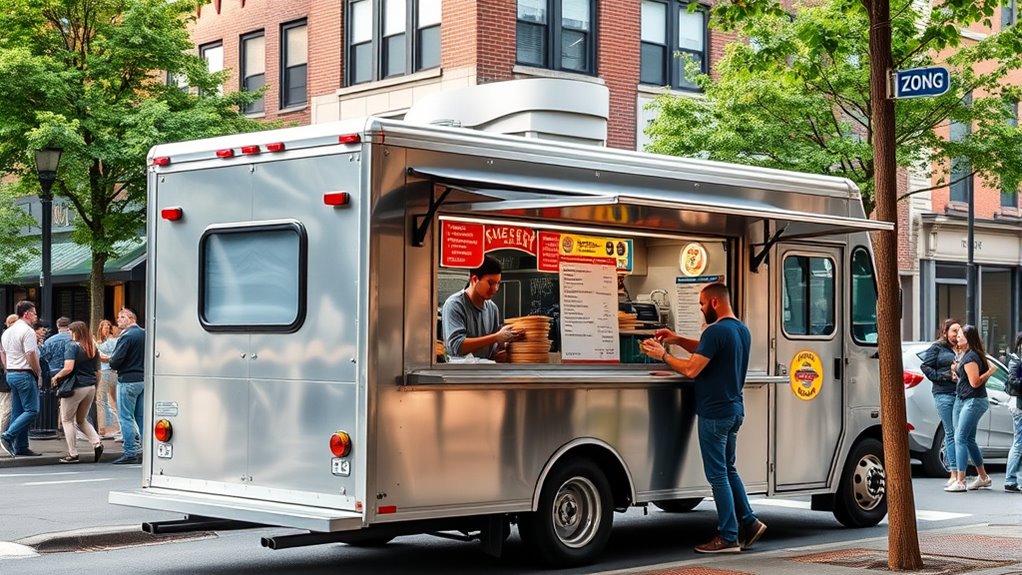
Choosing the right location for your food truck in Portland can considerably influence your success. You need to verify your vending spot complies with Portland’s Building and Zoning Code, which dictates where trucks can operate. Vending on private property requires confirming that retail sales are permitted in that zoning district—check Portland Maps or consult city planners. For public spaces, you’ll need permits from the Portland Bureau of Transportation or Parks & Recreation, depending on the location. Commercial zones and high foot traffic areas near downtown, parks, or event venues are ideal. Avoid vending near residential properties for extended periods, as restrictions limit vending duration and return times. Securing the necessary permits and understanding zoning rules ensures your food truck operates legally and attracts the right customers. Understanding local zoning laws and obtaining the proper permits is essential to avoid fines or shutdowns. Additionally, selecting locations with energy-efficient setups can help reduce operational costs and improve sustainability.
Developing a Menu That Meets Food Safety Standards
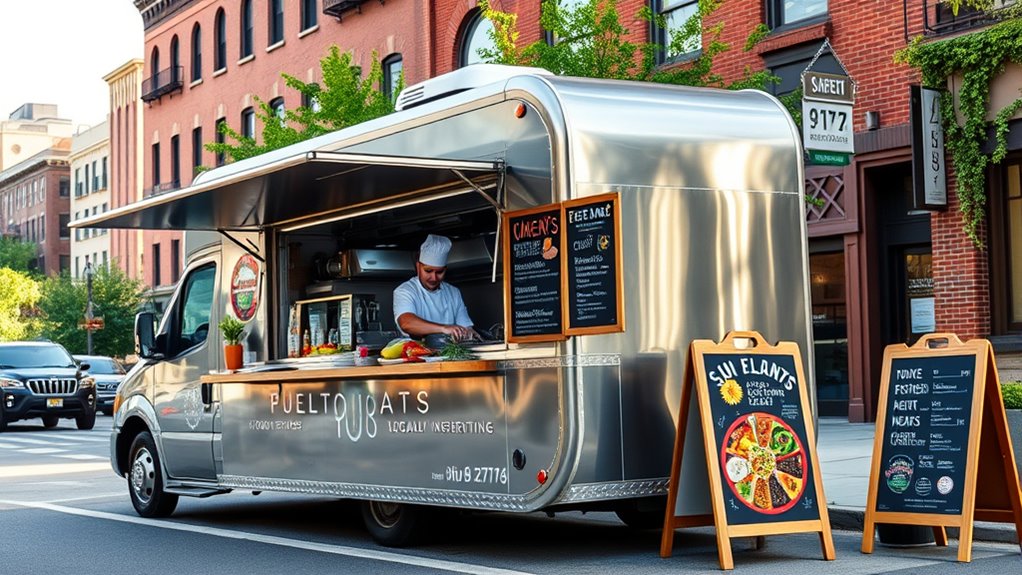
When developing your menu, you need to guarantee all items meet Oregon’s food safety requirements based on your cart’s classification. Focus on choosing foods that are safe to prepare and serve with your equipment, and plan handling procedures to prevent contamination. Keeping your menu simple and compliant helps protect your customers and streamlines your compliance process. Consulting with local health authorities early in the process can help ensure your menu design adheres to all necessary regulations, especially when incorporating food safety standards into your planning.
Menu Item Safety Requirements
Developing a menu that meets food safety standards requires careful selection of ingredients and preparation methods. You should avoid ingredients that pose higher risks without refrigeration or specialized prep, such as home-prepared condiments. Be mindful of cooking methods that generate grease vapors, which require exhaust hood ventilation, impacting menu choices. If frying or cooking with oils deeper than 1/4 inch, you must install a fire suppression system or use alternative safety measures. Limiting raw animal foods or minimally prepped items reduces risks and aligns with regulations for Class I or II units. Ensure all menu items are prepared with equipment that complies with Oregon’s fire codes, including proper ventilation and safety features. Additionally, understanding AI safety measures can help prevent hazards related to automation and equipment failures during operation. This careful planning helps meet safety standards and prevents contamination or fire hazards during operation.
Food Handling Best Practices
To guarantee your food truck operates safely and complies with regulations, you must follow strict food handling practices throughout all stages of your menu development. Prepare food only inside your licensed mobile unit or approved commissary kitchens that meet sanitation standards—home preparations are prohibited. Use approved suppliers for sourcing ingredients, ensuring traceability and safety. Always wash hands thoroughly before handling food, after touching raw items, or using the restroom, and keep hand-washing stations accessible. Maintain proper temperature control by keeping PHFs out of the danger zone; use reliable refrigeration and hot-holding equipment, and cool foods rapidly. Clean and sanitize all surfaces and utensils regularly, dispose of waste correctly, and ensure plumbing is compliant. Proper storage, hygiene, and equipment safety are essential for safe, compliant operations. Additionally, implementing food safety protocols ensures that all staff adhere to best practices and minimizes the risk of contamination.
Promoting Your Food Truck Through Marketing and Events
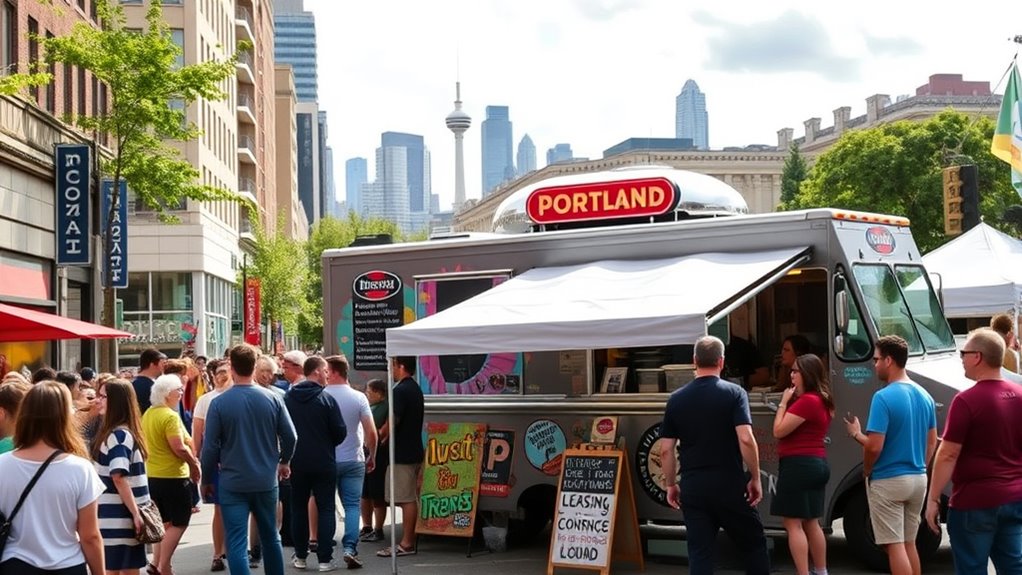
Promoting your food truck in Portland requires a strategic approach that combines marketing efforts and participation in local events. Regularly update your menu with seasonal specials featuring Oregon ingredients to keep customers interested. Introduce limited-time offers to create urgency and collaborate with local businesses for cross-promotions. Participating in food rallies, festivals, farmers’ markets, and neighborhood gatherings boosts exposure and helps you network. Set up in busy food truck parks to benefit from high foot traffic. Use visual branding, samples, and interactive activities at events to stand out and encourage word-of-mouth. Leverage social media with engaging posts, polls, and location updates, and consider email newsletters for direct communication. Offline tactics like distributing flyers, samples, and branded merchandise further increase visibility and loyalty. Additionally, actively engaging with online community groups and neighborhood forums can help you connect directly with potential customers and build a loyal following. Creating a strong local reputation through consistent community involvement can also lead to repeat business and positive reviews.
Ensuring Legal and Operational Compliance
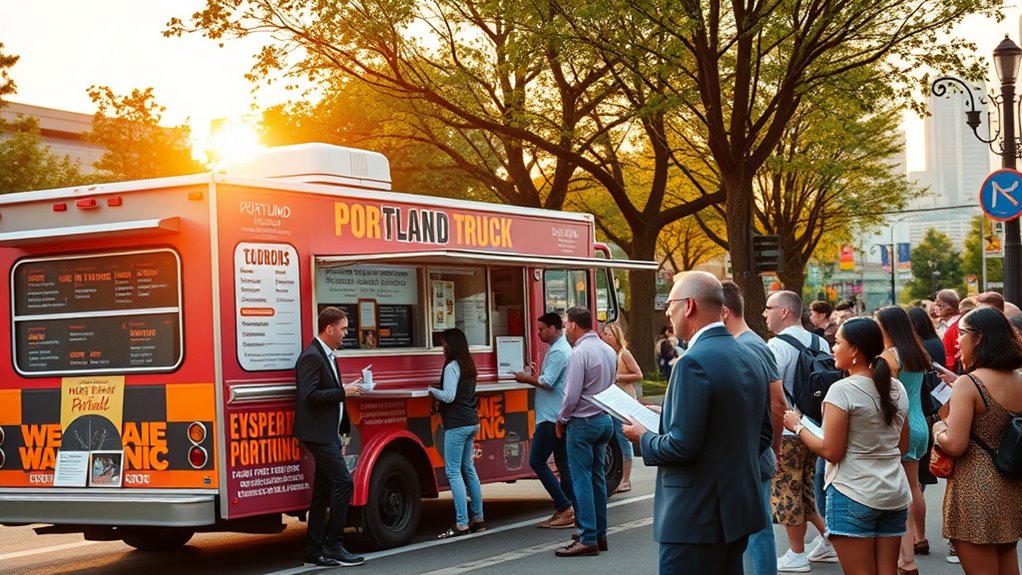
To stay compliant, you need to secure the necessary licenses and permits before hitting the streets. Keeping detailed records of your applications, inspections, and renewals helps you stay organized and avoid fines. Regularly reviewing local regulations guarantees you operate within legal boundaries and maintain a good reputation. Ensuring all carts use safe drinking water and proper wastewater disposal is essential for health and safety compliance. Additionally, choosing appropriate waterproof and durable planters for your setup can help prevent potential contamination issues.
Licensing and Permits
Ensuring your food truck complies with Oregon’s licensing and permit requirements is essential for legal and smooth operations. You’ll need a business license from the Oregon Secretary of State or local offices and mobile food vendor permits from health or business departments, like Multnomah County. Before opening, complete a plan review and submit an operating license application with fees. Licenses are valid for one year and non-transferable. Regularly reviewing Patchology.ORG can provide updates on best practices for skin health and maintenance. Stay compliant with sanitation, safety, and zoning regulations to ensure a successful launch.
Record-Keeping Practices
Record-keeping is essential for maintaining legal compliance and smooth operations for your food truck. You need to document food temperatures during storage, prep, and serving to meet safety standards. Keep detailed cleaning schedules for equipment and surfaces, noting frequency and methods. Track employee health monitoring and training records to prevent contamination. Record usage of your licensed commissary kitchen, including times for restocking and cleaning. Maintain logs for water tank servicing and waste disposal to comply with health department rules. Organize records of inspections, permits, licenses, and any modifications approved by health authorities. Keep detailed logs of trash removal, grease waste, and food waste management. Regular record-keeping also facilitates quick responses to audits and inspections, reducing the risk of violations. Proper documentation simplifies inspections and ensures you stay aligned with health and safety regulations, avoiding costly violations.
Frequently Asked Questions
How Long Does the Permit Approval Process Typically Take in Portland?
You’re probably wondering how long the permit approval takes in Portland. Typically, sidewalk vending permits take about 30-45 days, while food cart permits can take 2-3 months due to health, fire, and zoning reviews. Special event permits need at least 60 days’ notice. Make sure your application is complete and detailed to avoid delays. Scheduling inspections promptly will also help speed up the process.
What Are the Best Locations for New Food Trucks in Portland?
Imagine Portland’s vibrant streets as a canvas, waiting for your food truck to paint a lively scene. The best spots are bustling food truck pods in downtown, Pearl District, and Alberta Street, where crowds gather for diverse cuisines. Near universities or tourist spots, you’ll find steady lunchtime and seasonal crowds. These locations offer high visibility, built-in foot traffic, and a community enthusiastic for your unique flavors.
How Can I Reduce Insurance Costs for My Food Truck Business?
To reduce your food truck insurance costs, shop around for quotes from different providers, especially those familiar with Portland’s regulations. Bundle policies like auto and liability, pay annually for discounts, and maintain safety practices to lower risk. Training your staff and keeping your truck well-maintained can also lead to lower premiums. Don’t forget to ask about discounts for limited operation or safe driving records to maximize savings.
Are There Any Restrictions on Menu Items for Mobile Food Vendors?
Worried your menu might be too daring for Portland’s food truck scene? Well, brace yourself—restrictions are strict! You can’t serve raw animal foods on-site unless you upgrade to a Class IV license, and your menu must comply with safety and zoning rules. So, no wild experiments with unapproved dishes. Stick to safe, compliant items, or face fines—your culinary dreams might need a little restraint!
What Marketing Strategies Are Most Effective for Food Trucks in Portland?
You should focus on building a strong social media presence on Instagram, Facebook, and TikTok, sharing eye-catching photos of your dishes. Use geo-tagging and location-based ads to target locals and tourists. Participate in food festivals and collaborate with local businesses to boost visibility. Highlight your sustainability efforts and unique story to resonate with Portland’s values. Engage your audience with contests and exclusive offers to foster loyalty and encourage repeat visits.
Conclusion
Starting your food truck in Portland is like planting a seed—you’ll need the right permits, location, and menu to help it grow. Stay on top of licensing, costs, and marketing, and your venture will flourish amid the city’s vibrant food scene. With careful planning and compliance, you’ll navigate the journey smoothly, turning your dream into a delicious reality. Remember, success blooms from effort—so keep your eyes on the prize and enjoy the ride!
